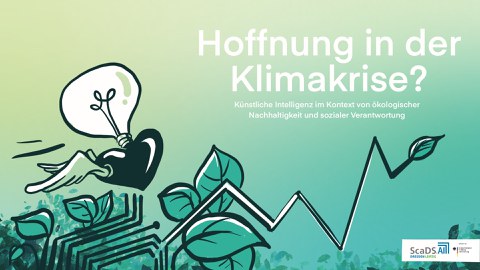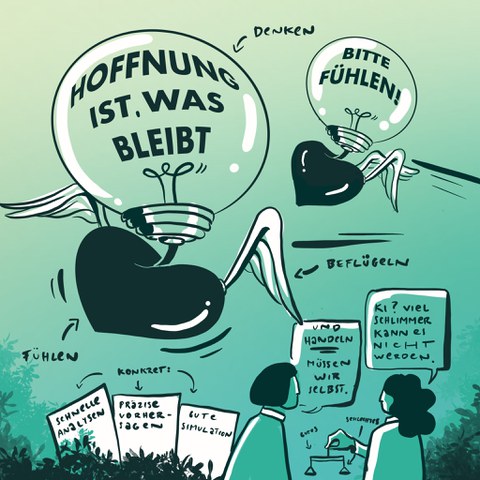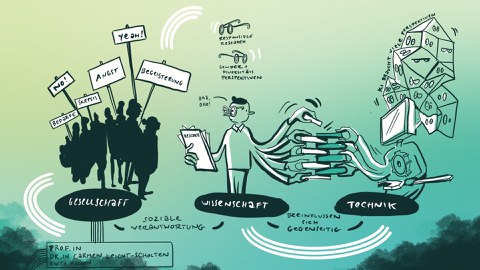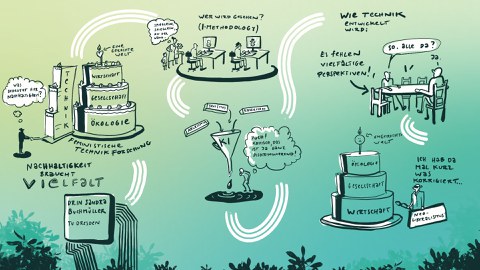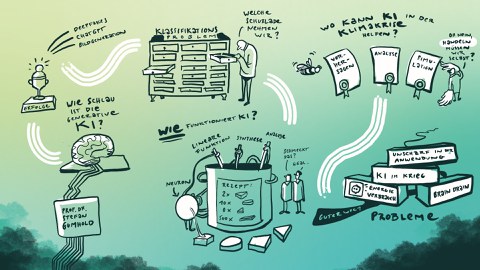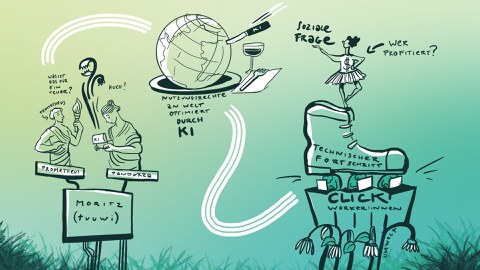Nov 28, 2023
Review Symposium - Hope in the climate crisis - Artifical Intelligence in the Context of Environmental Sustainability and Social Responsibility
Content embedding:
Dr.in Jutta Eckhardt: Officer for the Protection of Women's Rights and Equal Opportunities at TU Dresden
The climate crisis is here and is already exacerbating economic and social inequalities on a global scale. Sustainable concepts for countermeasures therefore reflect the most diverse scenarios and interactions and discuss the moment of responsibility of the individual and society, also in science, against the background of diverse value structures. Artificial intelligence can support problem-solving that meets current challenges in a transdisciplinary and networked way.
Dr. Andrea Blumtritt: Anti-discrimination officer in Saxony - initiating and supporting dialogue between politics, science and society, special concern: with a view to the digitization strategy in Saxony, participating in open discourses on the discrimination potential of AI
Prof.in Dr.in Carmen Leicht-Scholten: intellectual patron, Chair of Gender and Diversity in Engineering in the Faculty of Civil Engineering at RWTH Aachen University, 2nd seat in the Faculty of Arts, Humanities and Social Science, award for sustainable teaching in 2022 - In her video message, she described the integration of various social stakeholders in participatory processes as a key factor in driving transformations towards sustainable solutions. The "social responsibility and innovation" concept presented includes the inclusion of gender and diversity aspects, transparency and citizen participation in research and innovation processes.
Inspiring contributions:
Dr.in Sandra Buchmüller: Visiting Professor for Feminist Technology Research in the Faculty of Mechanical Science and Engineering at TU Dresden - shed light on the importance of gender and diversity aspects in the development of socially just technology. She emphasized the three dimensions of sustainability - ecology, economy and society - and their integration into technological development. The importance of the UN Sustainable Development Goals and the global and local impact of technologies such as e-waste and fast fashion were emphasized. The contribution of feminist technology research, which emphasizes the social construction of technology and the relevance of gender and diversity in design and use, was discussed. Approaches such as Human-Machine Reconfigurations and Feminist HCI Methodology were presented.
Prof. Dr. rer. nat. Stefan Gumhold: Chair of Computer Graphics and Visualization at the Faculty of Computer Science and Chairman of the Environment Commission at TU Dresden - very accessible introduction to the topic of AI with numerous examples. In-depth analysis of how AI works and where the problems lie in the area of tension between expectations and understanding. He highlighted the potential of AI technology to combat the climate crisis, weighed it up against energy consumption and the use of AI technology, which tends to lead to environmental problems. Hence the importance of personal responsibility. Maxime - the action lies with the human being as the executor, who must carry out and question.
Moritz: TU environmental initiative by students - took an offensively critical stance and used the image of Pandorra's box to situate artificial intelligence. Economic differences between the global or local geographical North and South are exacerbated by AI, for example by increasing the extraction of fossil fuels, relying on data sets that were created under poor working conditions and cementing positions of power. However, Moritz also emphasized the importance of positive images of the future that give us hope and motivate us to work for a better future. According to Tuuwi, the key question when designing AI applications should be how we want to live.
The ensuing discussion between the various participants reflected the spectrum that was opened up: who makes the rules, who defines the standards and how can a balanced opinion be organized at all in view of the rapid pace of technological development?
Supporting program:
Dr. Göde Both: German Centre for Higher Education Research and Science Studies Berlin - presented the Gendering Mint Digital project(https://www2.hu-berlin.de/genderingmintdigital/), which is an open educational portal providing insight into gender-sensitive natural and technical sciences.
Henrike Terheyden aka Kendike(https://www.kendike.de/)- documented the event with her uniquely light-footed and brilliant graphics. This visualization will make it easier for many to access a politically, socially and scientifically virulent and at times clearly polarized debate.
The conversation about AI is "the most important conversation of our time". (TEGMARK, 2017)
Location:
The venue was the Motorenhalle, the project center for contemporary art in Dresden's Friedrichstadt district. The current exhibition "Something with hope" addresses hope as a principle, a utopia of positive development, a "dreaming ahead" (Ernst Bloch). This provided a positively disruptive visual sounding board during the symposium. Afterwards, the participants were able to round off the evening in a relaxed atmosphere with culinary support from the neighboring Bauwagen-Café.
Further information and contacts for the Pillars & Umbrellas event series

